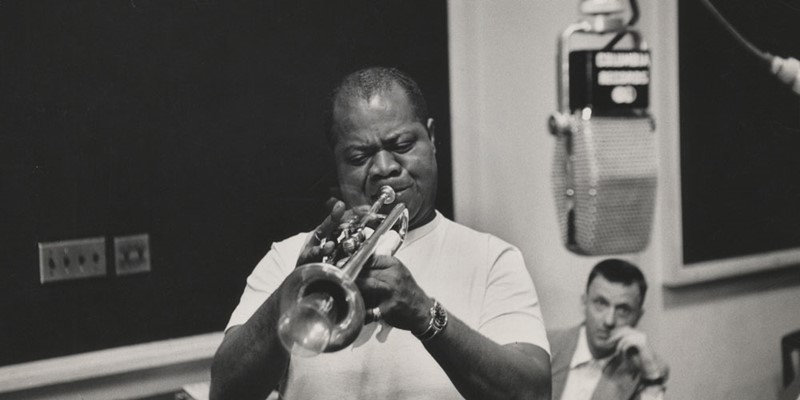Louis Armstrong died fifty years ago today at his home in Queens. I have spent much of the last decade and a half thinking and writing about Armstrong—first in a biography, Pops, then in a play, Satchmo at the Waldorf—and I expect I’ve said by now what I have to say about his beautiful, blessed life and work. So instead of trying to find a new way to sum up my feelings, I’ll simply reprint a passage from the last chapter of Pops. I hope you enjoy it.
* * *
Armstrong’s own unpublished and uncollected writings found their way into print with the publication in 1999 of Joshua Berrett’s Louis Armstrong Companion and Thomas Brothers’ Louis Armstrong, in His Own Words: Selected Writings. These books showed him as he was, not as others wished or imagined him to be, and the bluntness with which he spoke his mind from beyond the grave gave the lie to a half-century of abuse that Ossie Davis, who acted opposite him in A Man Called Adam, summed up in a reminiscence of their brief acquaintance: “Most of the fellows I grew up with, myself included, we used to laugh at Louis Armstrong. We knew he was good, but that didn’t save him from our malice and our ridicule. Everywhere we’d look, there’d be Louis—sweat popping, eyes bugging, mouth wide open, grinning, oh my Lord, from ear to ear….mopping his brow, ducking his head, doing his thing for the white man.” Davis changed his mind after meeting Armstrong, concluding that his horn was “where Louis kept his manhood hid all those years…enough for him…enough for all of us.” But if he had ever felt the need to hide it, he did so in plain sight, and the admiring musicians who knew him best never doubted that he was not just a man but a miracle. Some, like Teddy Wilson, emphasized his artistry: “I don’t think there has been a musician since Armstrong who had all the factors in balance, all the factors equally developed. Such a balance was the essential thing about Beethoven, I think, and Armstrong, like Beethoven, had this high development of balance. Lyricism. Delicacy. Emotional outburst. Rhythm. Complete mastery of his horn.” Others spoke of his humanity. “As I watched him and talked with him, I felt he was the most natural man,” the pianist Jaki Byard said. “Playing, talking, singing, he was so perfectly natural the tears came to my eyes.” But all agreed on his greatness, and marveled that such a being had walked the earth.
Today we live in a time far removed from his, and it is harder than ever before to bridge the gap and see him clearly. Some now judge him by the standards of a world he never knew, and find him wanting. “The relentlessly beaming smile, the handkerchief dabbing away the sweat, the reflexive bowing, the exaggerated humility and graciousness—all this signaled that he would not breach the manners of segregation, the propriety that required him to be both cheerful and less than fully human,” one recent commentator has written. But that broad smile was no mere game face, donned to please the paying customers: it told the truth about the man who wore it. In return for his unswerving dedication to his art, he knew true happiness, and shared it unstintingly with his fellow men, who responded in kind. Richard Brookhiser tells of how, when doing battle with cancer, he was unable to listen to any music other than the Goldberg Variations and Louis Armstrong: “Bach said everything is in its place; Armstrong said the sun comes shining through.” It was a response that Armstrong would have appreciated. Not long before he died, he wrote to a friend that “my whole life has been happiness. Through all of the misfortunes, etc, I did not plan anything. Life was there for me and I accepted it. And life, what ever came out, has been beautiful to me, and I love everybody.”
* * *
Louis Armstrong and the All Stars perform “On the Sunny Side of the Street” on TV in 1958. This is my favorite film clip of Armstrong in performance:

